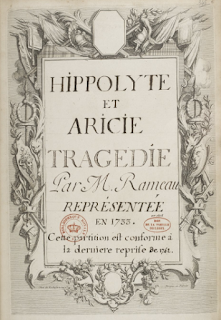Richard Strauss - Elektra
Conductor: Philippe Jordan. Production: Robert Carsen. Sets: Michael Levine. Costumes: Vazul Matusz. Lighting: Robert Carsen, Peter Van Praet. Klytämnestra: Waltraud Meier. Elektra: Irene Theorin. Chrysothemis; Ricarda Merbeth. Aegisth: Kim Begley. Orest: Evgeny Nikitin. Die Aufseherin: Miranda Keys. Fünf Mägde: Anja Jung, Susanna Kreusch, Heike Wessels, Barbara Morihien, Eva Oltivanyi. Orchestra and Chorus of the Opéra National de Paris.
“Sobriety” may not be the word you expect to settle on to sum up a performance of Elektra, as I did this Monday. This could explain why some critics have claimed this production was “tame”.
 |
| Strauss |
But again, “sobriety” was the operative word, and the dialogues, of which this work is, after all, largely a series, were sung with daring intimacy. Elektra’s confrontation with her mother was thus fascinatingly different from the usual panting slug-fest. The only question was, could people up on row 382 at the back of the second balcony actually hear the wonderful (and visually glamorous) Waltraud Meier? I was in row 15, and with the aisle (row 15 is great for stretching your legs), the fourteen rows in front plus the gaping orchestra pit between me and the stage, already I found the singers looking and sounding distant any time they moved away from the apron.
People don’t seem to have liked Carsen’s production very much, even criticising it for having too many wrong ideas. Yet coming after Py’s gimmick-filled Aida, it seemed to me positively minimalist. It was, again, sober. There was no curtain: Jordan slipped in in the dark. As the music started, and some light came on we discovered a titanic* space with sheer, vertical walls (and no doors) in what looked like slate, curving inwards at the base, and a brown, peaty floor. More like Agamemnon’s tomb than his palace, I thought, and that’s what it turned out to be when, once that tedious opening section with the maidservants was thankfully out of the way, a grave opened up in the floor and Elektra rose from her foetal position, in a disc of white light, and fished out his naked body to hug.
This was, I suppose, one of the ideas people didn’t like. Another was Elektra’s movements being mirrored, or emotions acted out, by 20-odd acolytes in the same plain black dress as hers. It's true there was, at least once, something perilously Busby-Berkeley-ish about this. They paraded the body around. Then there was Klytemnestra’s arrival, carried aloft by more women-in-black, on a litter: in fact, her bed, with silky white sheets matching her plain white slip. Aegisthus would later make his appearance in similarly silky white pyjamas and robe. The litter/bed was disposed of into the grave, which also served as palace entrance. This took flak for being somewhat incoherent. Elektra didn't dance at the end, apart from moving her hands (and I admit I missed the dance), but collapsed into the same position, face down in the peat, as at the start. Even the stark lighting, sometimes vertical, sometimes lateral and casting expressionistic shadows on the walls, somehow got some people’s goat.
I wonder what other productions they’ve seen? This cool, dark, choreographed show was perhaps more aesthetic than dramatic, but it suited the overall “sobriety”. And while Elektra is usually fairly well sung – I assume because nobody would be foolish enough to sign up for it without being sure of pulling it off – it isn’t necessarily well staged. None of the Paris productions I can remember, from post-nuclear bunkers to red-and-blue phalluses to gigantic, rattling metal structures, was especially brilliant. This, I decided as I walked out for dinner, was the best yet for me.
*OK, I was at the War Requiem the day before.



Comments
Post a Comment